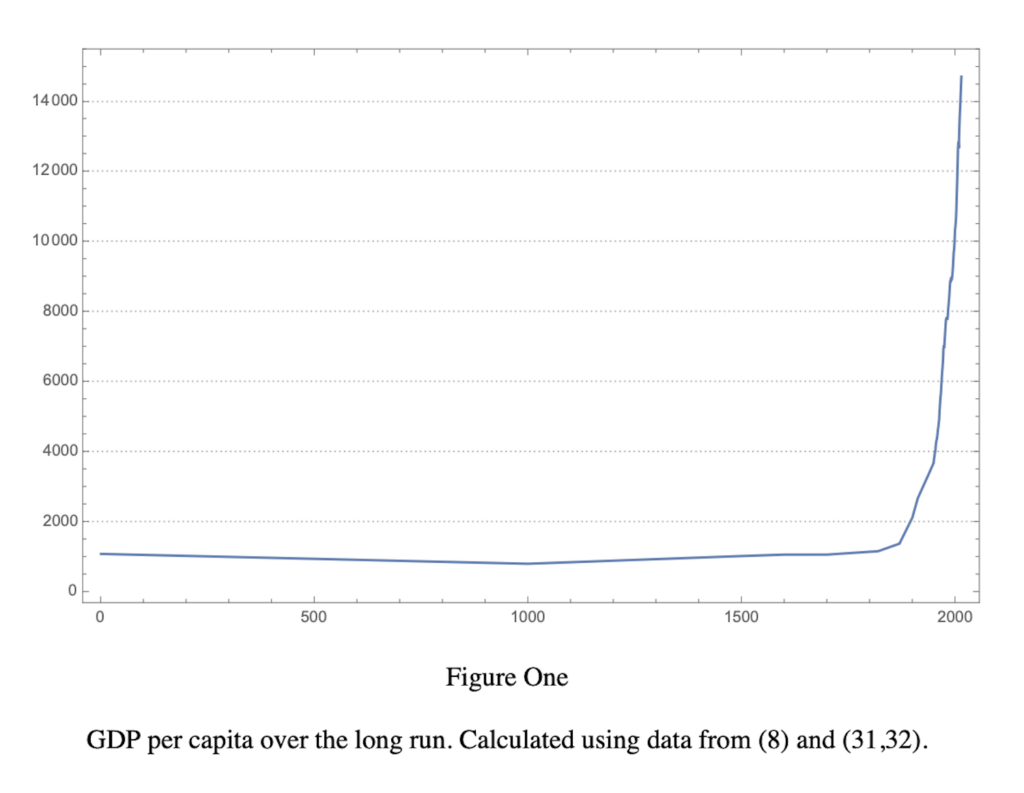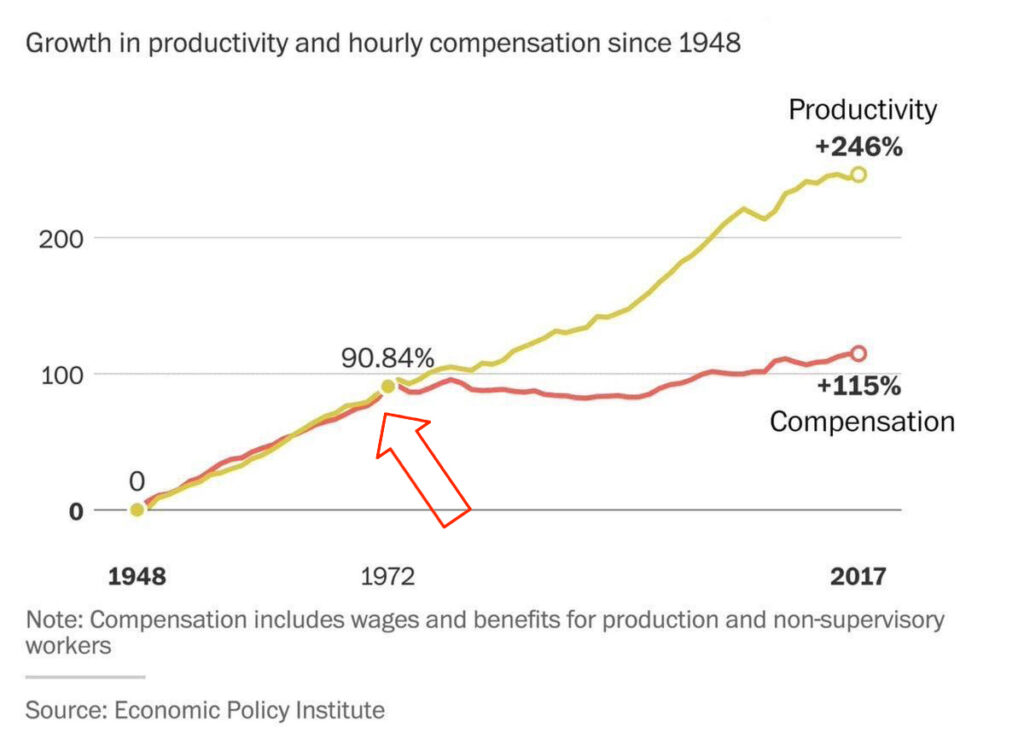We need to talk about AI and productivity


You hear and read about AI (Artificial Intelligence) everywhere. About children letting AI do their homework; about AI-generated art based on existing work by artists and about computer code written by AI. Tools and companies such as OpenAI, Midjourney and of course ChatGPT probably also sound familiar to you.
This piece is not about the latest AI developments. I’m not going to dive into the topic of hype versus reality and I’m not even going to talk about tools. I zoom out to see the bigger picture, because that’s where it gets really interesting.
What will be the impact of AI on our society?
The potential impact of AI is huge. And if we all want to benefit from it, we need to make fundamental changes to the system. To understand why the impact can be so great, I will take you back in time.
Between the 1870s and 1970s, productivity soared, increasing as much as fiftyfold. Peoples’ well-being also improved during that period.

For most, the gain was big:
- Working weeks went from 68 to 40 hours
- The average lifespan doubled: from 40 to 80 years
- Wonderful technological developments took place, such as cars, washing machines, plumbing, heating, penicillin, airplanes and electricity
- Employee safety improved 100 times
All of these benefits were especially noticeable in Western society.
You would expect that the computer and smartphone revolution and digital knowledge work would also lead to a new fifty-fold increase in productivity. And that was the expectation. For example, MIT AI pioneer Marvin Minsky predicted the following in 1970:
In three to eight years we will have a machine with the intelligence of an average human being.
We were…
- Able to work even fewer hours
- Able to work how, where and when we want
- Able to experience more freedom and passion in our work
However, that enormous productivity growth failed to materialise.
Productivity did increase, but compensation for it did not. Michael Simmons wrote an extensive piece on this that is worth reading.

Productivity has increased almost linearly since the 1950s, but wages have not. And the benefits of increased prosperity do not reach the population. The bottom line is this: the technological revolution we’ve seen since the 1970s has made the rich even richer. The increased wealth has thus ended up with the shareholders.
Since the 1970s, our development has stagnated in several areas:
- Energy prices are rising
- Healthcare costs are rising
- The CO2 level is constantly rising
- Extreme poverty is on the rise
You may now be wondering: How is this history of industrialization and productivity connected to AI? Well, I see the potential of AI to change this. This has to do with a Twitter thread from Richard Ngo, one of the researchers who works at OpenAI. He makes a list of predictions, and this is an important one:
AI will be able to beat any human at any computer task that someone with a desk job can do in ten minutes.
Ngo’s predictions feel very realistic compared to the claims made by other researchers.
The main thing I expect from AI is an expansion of knowledge work and the next productivity boost for people with office jobs. What the industrial revolution did for manual labour, AI will soon do for the knowledge worker.
Knowledge workers make up a quarter of the working population in the Netherlands. Worldwide, that is estimated to be about 20 percent. Translating a text, analyzing data, writing computer code, or even making a movie: it all gets a huge boost in productivity because AI does part or all of the work for you. Take this example:
Book a room in the hotel in Groningen where I stayed last year, but for two days, and this time I want a room with a view.
AI can solve that for you soon.
Every knowledge worker performs a lot of tasks in this category on a daily basis. In the past, we have seen that a boost in productivity greatly increases the standard of living.
Here’s a thought experiment to bring this concept to life. Let’s say I’m a single parent who works five days a week to make ends meet. Now I try to do the shopping after work or on Saturdays. Now imagine saying to an AI tool, “These are the five meals I want to cook this week, order all the stuff I need and make sure:
- I can prepare meals in less than 20 minutes
- The meals are healthy
- They are supplied by companies that offer the best prices at the moment”
That is an increase in productivity and an improvement in the quality of life. And for the first time in history I actually see this happening.
From shareholder value to system value
Let’s be honest. It is a realistic but somewhat utopian vision. Because there is one big problem. If we increase productivity in our existing systems, most of the benefits will end up in the same places they have landed for the last 50 years: with shareholders.
In the past two years, the richest 1 percent has amassed nearly twice as much wealth as the rest of the world combined. That’s bizarre. Capitalism and the system we use to manage organizations and the wealth they have is broken. If we want productivity to benefit us all, we need to change the system. We have to stop working on shareholder value, we have to move towards a model that adds value to the whole system. That means rethinking things like markets, shareholders, ownership, stocks, and perhaps most importantly, tax systems.
Companies must start paying fair taxes in the countries where they make their money. Yes Amazon, yes Apple, yes Shell. I’m looking at you. No more tax deals. You must pay where you deserve it.
In addition, we must ensure that we tax wealth rather than labour.
If history teaches us anything, it is that wealth for a select few adds little to society as a whole. Our ability to be productive and its benefits have greatly improved our lives.
It’s great that AI is bringing us the next boost in productivity, but we need to change the system if we want society as a whole to benefit.
Now read Pt 2: The future of AI: from ChatGPT and AutoGPT to a personal AI assistant
Now read Pt 3: This is why AI is not going to replace humans
Now read Pt 4: The primary fallacies of “the AI dilemma”
Keen on a quarterly slice of succinct insights from the inside track? Sign up to our newsletter.